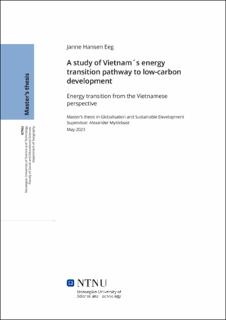| dc.contributor.advisor | Myklebust, Alexander | |
| dc.contributor.author | Hansen Eeg, Janne | |
| dc.date.accessioned | 2023-07-20T17:21:24Z | |
| dc.date.available | 2023-07-20T17:21:24Z | |
| dc.date.issued | 2023 | |
| dc.identifier | no.ntnu:inspera:142263345:35499477 | |
| dc.identifier.uri | https://hdl.handle.net/11250/3080615 | |
| dc.description.abstract | Denne masteroppgaven undersøker hvordan en energiomstilling ser ut fra det vietnamesiske perspektivet ved å bruke Cherp et al (2018) sitt metateoretiske rammeverk med tre perspektiver på nasjonale energiomstillinger. Ved bruk av tekstanalyse av vietnamesiske politikk- og strategidokumenter gir denne oppgaven en oversikt over viktige teknoøkonomiske, - sosiotekniske, - og politiske faktorer som påvirker den vietnamesiske energiomstillingen. Vietnam er for tiden avhengig av fossil energi og opplever en økende importavhengighet ettersom energiforsyningen ikke holder tritt med det økende energibehovet i den raskt voksende økonomien. Vietnam har stort potensiale for både sol- og vindkraft og har sett suksess med både sol- og vindkraftutbygging. Men kraftnettet for integrering og overføring, er ufullstendig og opplever flaskehalser, og er foreløpig ikke i stand til å håndtere nivået av generert fornybar kraft. Energisystemet har sterke statlige virksomheter innen fossilt brensel og kraftnettet, som fungerer som hovedaktører.
Vietnams nylige suksess med sol og vind, målet om netto nullutslipp innen 2050 og beslutningen om å slutte seg til Global Coal to Clean Power Transition Statement er positive skritt for energiomstillingen. Vietnam balanserer en voksende økonomi og økende energibehov samt behovet for utslippsreduksjon og utslippsopptak, i et energisystem avhengig av fossil energi. Funnene tyder på at energiomstilling i Vietnam signaliserer energisikkerhet. Ved å øke energiforsyning gjennom energi diversifisering med utvikling av fornybar energi, kan Vietnam redusere sin økende avhengighet av importert fossil energi og spesielt kull. Omstillingen fra fossil energi til fornybar energi i Vietnam skjer side om side med utviklingen av energisektoren. Energiomstillingen i Vietnam er både nasjonal og global, da Vietnam fremhever behovet for internasjonal støtte innen finansiering, teknologioverføring og kapasitetsbygging. | |
| dc.description.abstract | This thesis investigates what an energy transition looks like from the Vietnamese perspective using the meta-theoretical three perspectives framework on national energy transitions by Cherp et al (2018). Using this framework this thesis give overview of important techno-economic, - socio-technical, - and political factors influencing the energy transition pathway as highlighted by Vietnam. This thesis uses the method of textual analysis of Vietnamese policy and strategy documents. Vietnam is currently dependent on fossil fuels and is experiencing increasing import dependence as domestic supply cannot keep up with the increasing energy demands in the rapidly growing economy. Vietnam has great potential for both solar- and wind power and has seen success with both solar- and wind power development. But the power grid for integrating and transmitting, is incomplete and experiencing bottlenecks, and is currently not able to handle the level of renewable power generated. The energy system has strong state-owned enterprises in fossil fuel and the power grid, functioning as the main actors.
Vietnam´s recent success with solar and wind, the net-zero emissions target by 2050 and the decision to join the Global Coal to Clean Power Transition Statement are positives steps in the energy transition pathway. Vietnam is balancing a growing economy and increasing energy demands with the need for carbon mitigation, in a fossil fuel dependent energy system. The findings suggest that energy transition in Vietnam signals energy security. By increasing domestic supply through diversification of the energy mix with renewable energy development, Vietnam can reduce its increasing dependance on imported fossil fuel and particularly coal. Transitioning from fossil fuel to renewable energy for developing Vietnam is occurring alongside energy sector development. Energy transition in Vietnam is both national and global, as Vietnam highlight the need for international support in financing, technology transfer and capacity building. | |
| dc.language | eng | |
| dc.publisher | NTNU | |
| dc.title | A study of Vietnam´s energy transition pathway to low-carbon development | |
| dc.type | Master thesis | |
